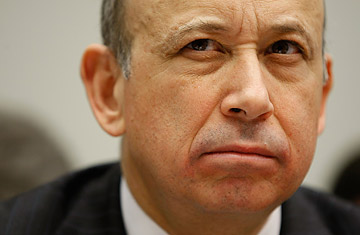
Goldman Sachs chairman and CEO Lloyd Blankfein testifies before the House Financial Services Committee on Feb. 11, 2009
In a clear departure from the historical norm, the White House is not cheering the return of huge profits to Wall Street. On the contrary, the recent windfalls at Goldman Sachs and JPMorgan, and the promise of giant year-end paydays for banking executives and traders, has caused a bit of consternation in the West Wing, coming as it does so soon after the taxpayer bailouts saved the entire financial system from total collapse.
"If I were a Wall Street firm, I would perhaps be cognizant of the fact that the financial regulatory-reform process is only beginning in Congress," warns a senior White House official, speaking about the political problems that huge paydays at Wall Street firms could create later this year, when new laws to regulate the industry will be written on Capitol Hill. Officials have also begun to worry aloud whether the Wall Street firms learned anything from the catastrophic financial crisis that was largely of their making or whether they are now returning to the old business of making short-term profits that create long-term risks.
On July 14, Goldman Sachs posted second-quarter profits of $3.44 billion, more than the company made in all of 2008 and about on par with the precrisis gilded age, while announcing that it had set aside $11.4 billion this year to compensate workers, or $386,489 per employee. The huge profits were hailed on Wall Street as another sign that the crisis might be ending. On July 15, the Dow Jones industrial average jumped 3.1%, and other banking giants are expected to issue their own similarly glowing reports. On July 16, JPMorgan announced that it had earned $2.7 billion in the second quarter.
The good news for traders has created two distinct concerns for President Obama's advisers. The first problem is political. For much of the year, populist revulsion at Wall Street greed has been palpable. Obama, who prides himself on his cool countenance, has repeatedly channeled this fury, flashing anger and frustration at the logic of financial titans, who continued to justify huge paydays even as their banks begged financial lifelines from the U.S. taxpayer. "That is the height of irresponsibility," the President said in January, after a report emerged of large 2008 bonuses on Wall Street. "It is shameful."
But the President has thus far resisted calls for a heavy government hand in limiting financial paydays, aside from certain limits on senior executives at firms that have not paid back some taxpayer funds and a number of proposals for regulators to develop new ways of better tying compensation to long-term risks. That leaves the White House vulnerable in the coming months. If Wall Street decides to cash in on its recent winnings despite the public rhetoric of the Administration, the contrast with the nation's still growing unemployment rate couldn't be starker. "It's just got to feel wrong to a lot of people," says Douglas Elliott, a fellow at the Brookings Institution, speaking of the Goldman compensation announcement. "It seems to me a political mistake."
The eye-popping Goldman profits also create a policy problem for lawmakers, including the President, as they try to reform the financial system to ensure that history does not repeat itself. At issue is not just the safeguards that traders are using to ensure that another crisis of confidence doesn't occur, but whether traders on Wall Street are taking advantage of the public backstop against systemic failure to create personal profits. "We want financial systems to be healthy," says Robert Gibbs, the White House press secretary. But, he adds, "the President continues to have concerns that compensation will be based on risky behavior instead of performance."
Though both Goldman and JPMorgan have paid back their infusion of Treasury dollars, the recent crisis has made clear to investors that the firms are considered by U.S. policymakers to be "too big to fail." The crisis has also created a premium for those firms willing to take on more risk in trades. According to company data, Goldman — which converted to a commercial bank at the height of the crisis in order to gain easier access to cheaper government credit — has significantly reduced its leverage ratio, which measures how much money it borrows, from 27.9 at the beginning of 2008 to 14.2 today. At the same time, Goldman has increased the amount of money it is risking on a day-to-day basis, and the number of competitors it faces in the marketplace has significantly shrunk, with onetime stalwarts like Bear Stearns and Lehman Brothers becoming casualties of the crisis.
The President's financial reforms, which were sent to Congress earlier this summer, have yet to be acted upon by the banking committees in the House and Senate, and White House officials do not expect concrete legislative action until late this year at the earliest. That means that both the White House and Congress can expect many more months of needing to explain why it is O.K. for Wall Street to be thriving while the rest of the country, and much of the world, is suffering. As Gibbs explained on July 15, when asked about the big Wall Street paydays, "It is something that continues to be a great concern."
